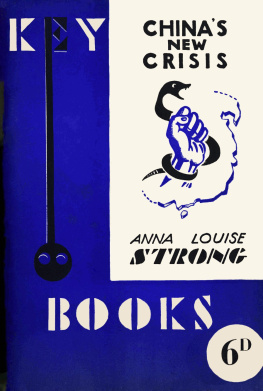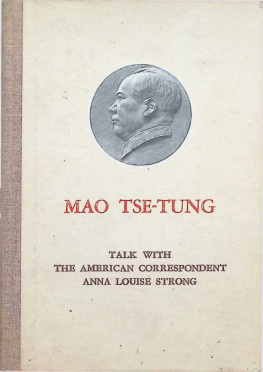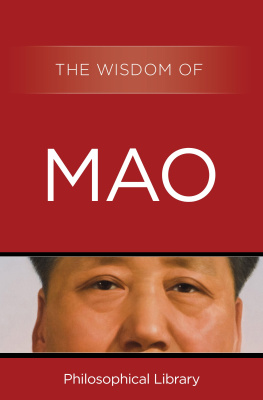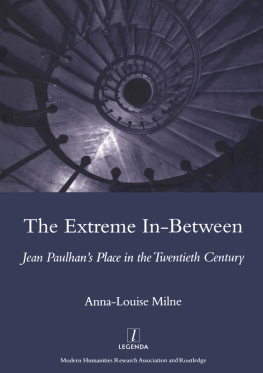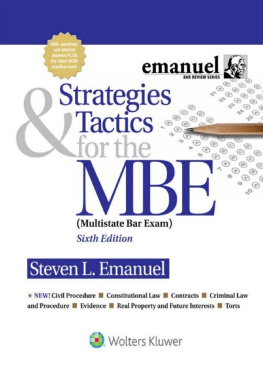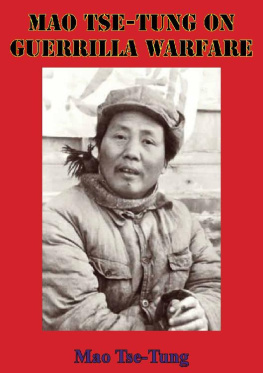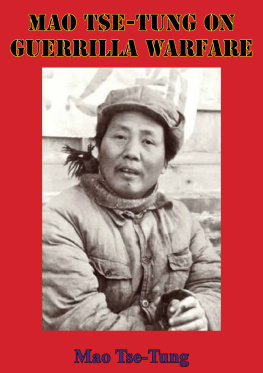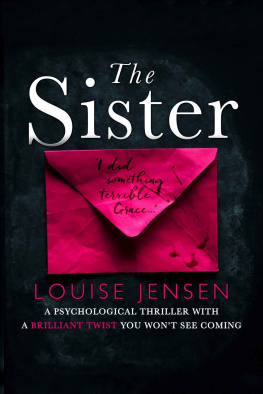Anna Louise Strong - The Thought of Mao Tse-Tung
Here you can read online Anna Louise Strong - The Thought of Mao Tse-Tung full text of the book (entire story) in english for free. Download pdf and epub, get meaning, cover and reviews about this ebook. year: 1947, publisher: Amerasia, genre: Politics. Description of the work, (preface) as well as reviews are available. Best literature library LitArk.com created for fans of good reading and offers a wide selection of genres:
Romance novel
Science fiction
Adventure
Detective
Science
History
Home and family
Prose
Art
Politics
Computer
Non-fiction
Religion
Business
Children
Humor
Choose a favorite category and find really read worthwhile books. Enjoy immersion in the world of imagination, feel the emotions of the characters or learn something new for yourself, make an fascinating discovery.

- Book:The Thought of Mao Tse-Tung
- Author:
- Publisher:Amerasia
- Genre:
- Year:1947
- Rating:3 / 5
- Favourites:Add to favourites
- Your mark:
- 60
- 1
- 2
- 3
- 4
- 5
The Thought of Mao Tse-Tung: summary, description and annotation
We offer to read an annotation, description, summary or preface (depends on what the author of the book "The Thought of Mao Tse-Tung" wrote himself). If you haven't found the necessary information about the book — write in the comments, we will try to find it.
The Thought of Mao Tse-Tung — read online for free the complete book (whole text) full work
Below is the text of the book, divided by pages. System saving the place of the last page read, allows you to conveniently read the book "The Thought of Mao Tse-Tung" online for free, without having to search again every time where you left off. Put a bookmark, and you can go to the page where you finished reading at any time.
Font size:
Interval:
Bookmark:
by Anna Louise Strong
Reprinted From Amerasia June, 1947
15 Cents
epub version 1.0
Editorial Note: The following is an excerpt from a letter written by Anna Louise Strong concerning this article: This letter concerns a special article that I have just finished, after working at it on and off for two months. It is The Thought of Mao Tse-tung and is the first time Chinese Marxism has been summarized, in English at least. I had several all-day interviews with Yenan theoreticians on the subject; after the article was written, it was translated back into Chinese and corrected in great detail, with additions made, a lot of important people spending quite a bit of time
Mao Tse-tung is one of Asias most notable leaders and thinkers. He is Chairman of the Chinese Communist Party and for nearly twenty years has lived blockaded, shut off from the world by the battle fronts of foreign and civil wars. From this seeming isolation, the thought of Mao Tse-tung shapes the Chinese Revolution and is expressed in regional governments representing 140 million people in North China and Manchuria.
From his distant Yenan cave Mao Tse-tung even became a world figure. His thesis on protracted war predicted the course of the Chinese peoples resistance to Japan so accurately that it became an accepted formula in other lands among military experts who never knew whence it came. His theories on new democracy have probably affected new government forms in postwar Europe. His analysis of the path to national independence, peoples democracy, and peoples livelihood charts a way not only for the Chinese people but for the billion folk that live in the colonial countries of southeast Asia.
The thought of Mao Tse-tung, despite its wide influence, has never been clearly and fully summarized abroad. It has reached the outside world spasmodically, with long intermissions, due to the blockade of war. In America, people still raise the childish antithesis: Are the Chinese Communists followers of Moscow or are they what the West calls democrats? The answer is that they are neither, though to some extent they are a little of both. They are Chinese trying to solve the bitter problems of China, using their own ideas and also any valid ideas they find in the West. Specifically they use the method of social analysis known as Marxism. Because they are Chinese, applying their thought to Chinese problems, their policies and even their concepts of Marxism have increasingly diverged from the European pattern. Their thought is not dependent, but creative. Its creative quality comes, first of all, from Mao Tse-tung.
Mao Tse-tungs great accomplishment has been to change Marxism from a European to an Asiatic form, said Liu Hsiao-chi, whom the Chinese Communists consider their second greatest Marxist thinker, and to whom I went for an estimate of Maos thought. Marx and Lenin were Europeans; they wrote in European languages about European histories and problems, seldom discussing Asia or China. The basic principles of Marxism are undoubtedly adaptable to all countries, but to apply their general truth to concrete revolutionary practices in China is a difficult task. Mao Tse-tung is Chinese; he analyzes Chinese problems and guides the Chinese people in their struggle to victory. He uses Marxist-Leninist principles to explain Chinese history and the practical problems of China. He is the first that has succeeded in doing so. Not only has he applied Marxist methods to solve the problems of 450 million people, but he has thus popularized Marxism among the Chinese people as a weapon for them to use. On every kind of problem the nation, the peasants, strategy, the construction of the party, literature and culture, military affairs, finance and economy, methods of work, philosophy Mao has not only applied Marxism to new conditions but has given it a new development. He has created a Chinese or Asiatic form of Marxism. China is a semi-feudal, semi-colonial country in which vast numbers of people live at the edge of starvation, tilling small bits of soil. Its economy is agricultural, backward, and dispersed. In attempting the transition to a more industrialized economy, China faces the competition and the pressures economic, political, and military of advanced industrial lands. This is the basic situation that affects both the relations of social classes and the methods of struggle towards any such goal as national independence and a better, freer life for the Chinese. There are similar conditions in other lands of southeast Asia. The courses chosen by China will influence them all.
The Chinese Communist Party, like other Communist parties, regards itself as the advance group of the proletariat. In China it considers itself the spokesman and leader for other classes as well, notably the peasants, the petty bourgeois, and the middle class of the cities and towns. Even the concept of the proletariat as a base for the Communist Party is given a new meaning. Liu Hsiao-chi was quite explicit about it. According to Marx, he said, the industrial workers are the only class that can accept communism and bring it to fruition. This is true for several reasons; 1) they own no means of production; 2) they live by selling their labor-power; 3) they are disciplined by working collectively in a factory with other workers.
All this applies to the western world said Liu Hsiao-chi. But in China we have only a few such people. Of our 450 million people, only two or three million can be called industrial workers, whom the imperialist and capitalists are training to be the reserves of the Communist Party some day. Meanwhile Mao Tse-tung is training another two or three million from another kind of people who are not only no less disciplined and devoted, but in fact perhaps even more disciplined and devoted than the industrial workers.
Take this little devil who is bringing you tea and melon seeds and peanuts. He has been brought up and trained in this special, highly military Communist organization of ours. It does not occur to him to ask for peanuts for himself. He knows that peanuts are limited, that they are for guests and for parties, and that he will only get them at some birthday party, not before. He knows that he will get food of whatever kind we have enough of, and a summer uniform and a winter uniform. He does not ask any more. He is happy because he is a comrade among comrades, because he is respected as a human being, because he is fighting for a better life for all the people in China, in which he too will share.
China has only a few industrial workers to be the foundation of communism but we have millions of kids like this. Such people were never known by Marx, but they are brought up in the spirit of communism. Their discipline and devotion to public affairs is no less than that of industrial workers. They give their lives to the fight against foreign imperialism and native oppressors even when very young. They fight now for the new democracy but if in the future it is time to build socialism, they will be ready to build it. If it is time for communism, they will be ready for that also. Only one thing they will not build or accept the old forms of capitalism. They have never even dreamed of making a profit.
Today we are building capitalism, but it is a new capitalism. Capitalism is needed to break down the semi-feudal, semi-colonial society in which we live today. We encourage free initiative, we encourage capitalist profit. But we do not permit the formation of monopolistic capital. Meanwhile we have a publicly administered economy and an extensive cooperative economy, both of which are very important. As the core of this new democracy and new capitalism we have three million people the army, the party, and the government who have lived for twenty years in what might be called military communism. It is not the military communism they had in Russia, for here it is applied only to this leading group. These are some of the inventions of the Chinese Communist Party; they are created chiefly by the genius of Mao Tse-tung.
Font size:
Interval:
Bookmark:
Similar books «The Thought of Mao Tse-Tung»
Look at similar books to The Thought of Mao Tse-Tung. We have selected literature similar in name and meaning in the hope of providing readers with more options to find new, interesting, not yet read works.
Discussion, reviews of the book The Thought of Mao Tse-Tung and just readers' own opinions. Leave your comments, write what you think about the work, its meaning or the main characters. Specify what exactly you liked and what you didn't like, and why you think so.

